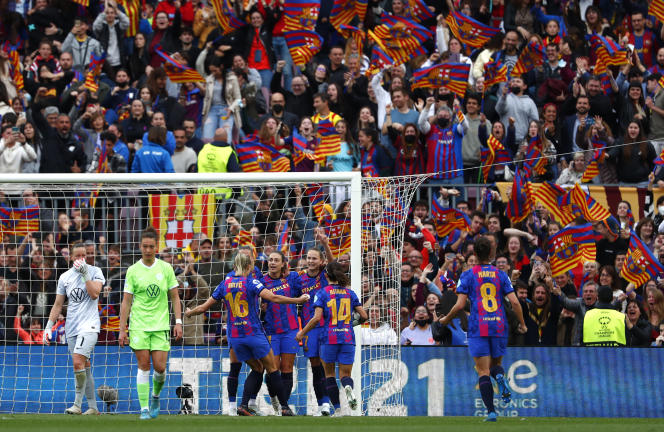European football experienced a small cataclysm on the evening of May 16, 2021. Crowned European champions after their victory against Chelsea (0-4) in the Champions League final, the FC Barcelona players brought to the Catalan club – and a Spanish formation – a first European Cup, ending the hegemony of Olympique Lyonnais (OL) and the German trio Wolfsburg-Potsdam-Frankfurt, who had monopolized fifteen of the last sixteen editions.
The event was no accident, as Jonatan Giraldez’s players have the opportunity to retain their title this year. On Saturday May 21, they face OL in the final, at the Juventus Stadium in Turin (Italy).
A new Spanish victory in the most prestigious European competition would redraw the landscape of women’s football a little more. If it is still too early to speak of a transfer of power, it would nevertheless confirm the emergence of a new heavyweight.
“A will to shine fast”
Until then, while Lyon piled up five consecutive Champions Leagues, between 2016 and 2020, the Catalan “Femeni” had most often been confined to supporting roles in Spain, in the shadow of Atlético de Madrid.
Elise Bussaglia experienced this period and is one of the rare French women to have walked the Catalan turf, between 2017 and 2018. Even if her passage was not crowned with a major title, the former midfielder experienced the transition to the tops. “In my time, there was already the ambition to build a competitive team, a strong desire to shine quickly on the European scene. It was just the beginnings, but in a short time they managed to be European champions ”, traces the ex-international to 192 selections with the Blue.
The Barcelona flight has its source in 2015, the year of the professionalization of the club, synonymous with restructuring. Until then, the team suffered from a lack of resources, which particularly affected training. “Alexia Putellas, for example [who received the Golden Ball for the best footballer of the year 2021], had to leave Barça, because the club had closed two youth teams”, recalled, in March, in the columns of El Pais, the current sports director of the women, Markel Zubizarreta.
The staff has since corrected the situation. “We now have youth categories ranging from 12 to 19 years old. Two new teams will be created for next season. The academy will go from 100 to 140 players for the coming year, ”explains, for Le Monde, the Catalan leader.
Flawless in Spain
As for men, the local pool is at the heart of the sports project. Many players from the Catalan region make up the squad. Among them, the star Alexia Putellas (returned to the club in 2012) or even Aitana Bonmati, symbols of a “Barcelona-style” game identity based on possession of the ball and doubling of passes.
“The precepts and instructions of the game are learned from an early age to children, boys or girls. All Spanish players are trained with the identity of Barça. It creates a competitive team, with a DNA developed over several years, to which we add foreigners to fill certain gaps, such as speed, “said Elise Bussaglia.
In the summer of 2021, the “Masia” training center hosted its first nine players, when, until then, apprentice footballers were forced to return home after training. Some have been able to evolve with the first team this season (Ona Baradad, Martina Fernandez).
This strategy seems to have paid off. The club has established itself, since 2020, as the steamroller of Iberian football. The Catalans have just won a third title of Spanish champions in a row, achieving a faultless (30 successes in 30 games). FCB have lost only one match this season, against Wolfsburg in the Champions League semi-final second leg (2-0).
Budget tripled since 2015
Elise Bussaglia is formal: “A team that puts in a lot of money is almost guaranteed to win a Champions League in the next three years,” she says. An equation that the president of Lyon, Jean-Michel Aulas, understood before anyone else, when he created the women’s section in 2004, to make it the most successful club in Europe.
At Barça, the budget has tripled since 2015 (from 1.5 to 4.5 million euros) and the number of employees has quadrupled in the same interval (from 5 to 20 people). This expansion is due in particular to the partnerships forged by the club, starting with the American tool brand Stanley, jersey sponsor since 2018, which provides 3.5 million annually to the “Femeni”. The latter will also benefit, from next season, from the agreement concluded with the Spotify streaming platform, for a sum of 70 million euros per fiscal year, for the next three years. The distribution between the men’s and women’s teams has not yet been decided.
In an interview with The Athletic in early May, Jean-Michel Aulas insisted on the need to “increase Lyon’s budget in the face of the emergence of Barcelona”. Before adding: “We tracked two or three players in the last two years and each time the players went to Barcelona, whose [financial] offers were higher. »
Barcelona also played the increased visibility card with the relocation of big posters to the Nou Camp, the club’s historic stadium. The Champions League semi-final first leg against Wolfsburg (5-1) on April 22 broke the attendance record for a women’s football match, with 91,648 spectators. “Besides being a great team, they fill stadiums. It can only be an example, “said OL defender Selma Bacha after the victory against PSG in the semi-finals on April 30.
Catalan President Joan Laporta already sees his team as “the best in the world”. To prove it, it will first be necessary to get rid of the seven-time European champions. In the game of direct confrontations, the advantage goes, for the moment, to the “Fenottes” of Lyon, with three victories in as many European duels.

















